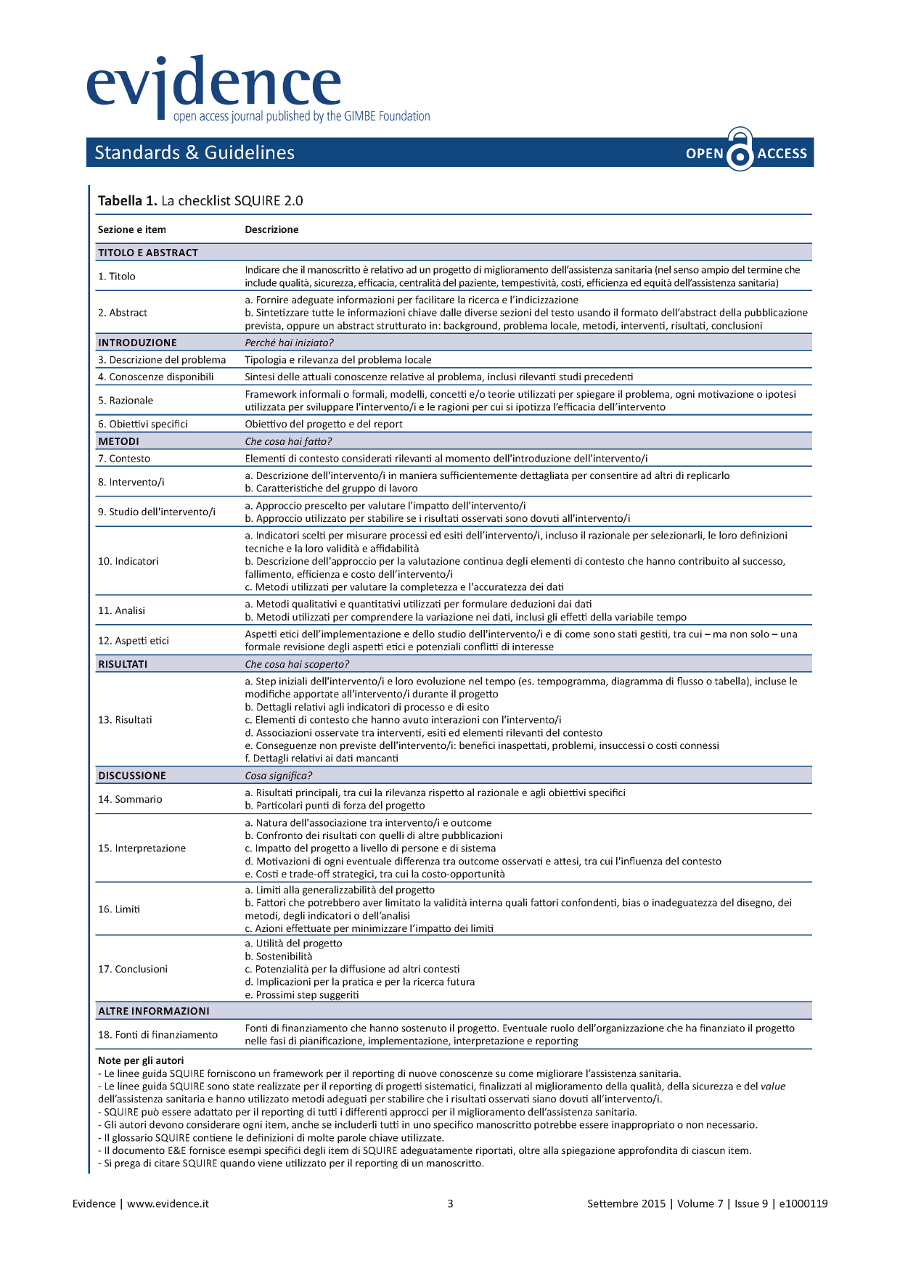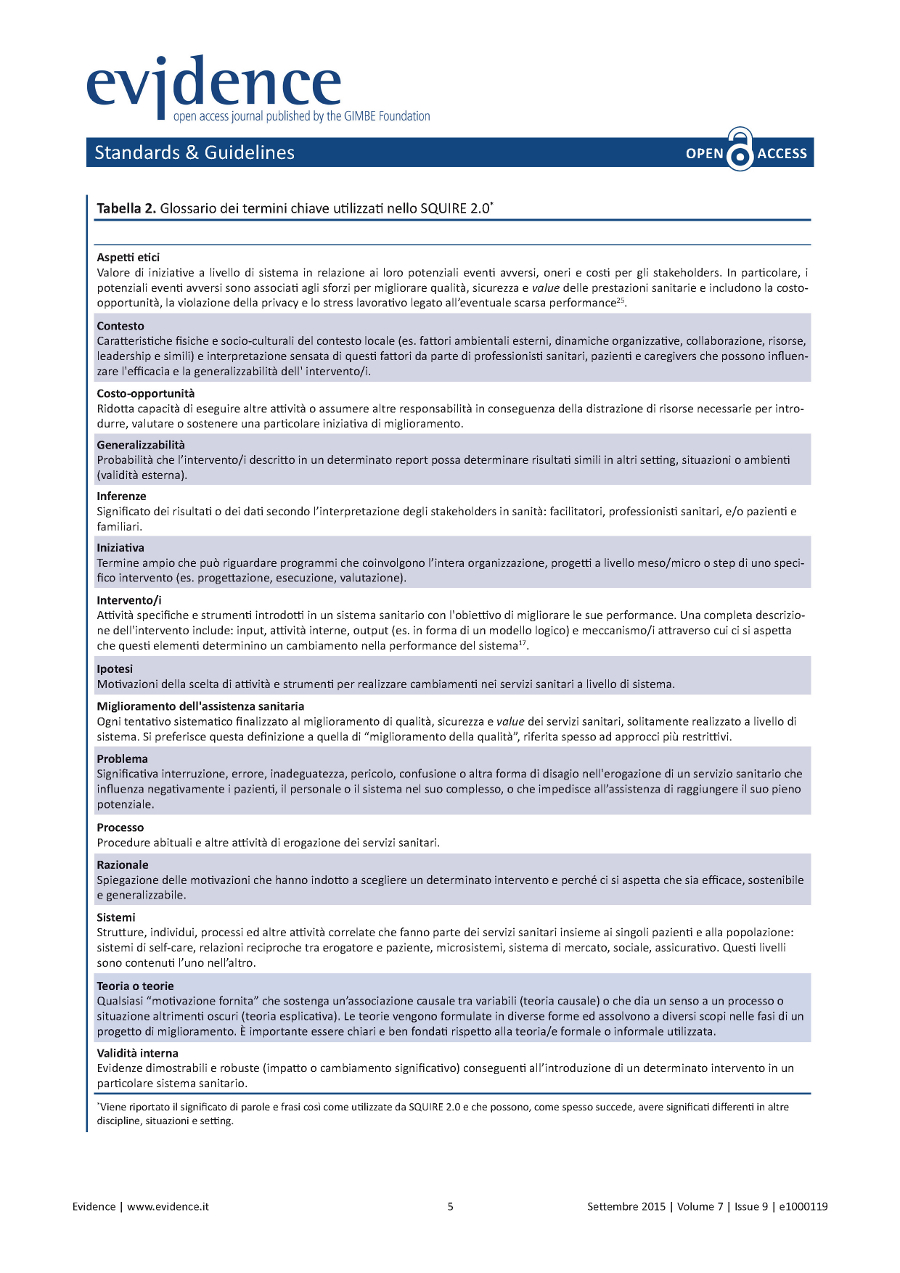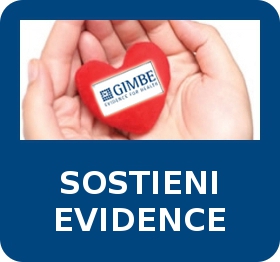Guidelines & Standards
Evidence 2015;7(9): e1000119 doi: 10.4470/E1000119
Pubblicato: 14 settembre 2015
Copyright: © 2015 Ogrinc. Questo è un articolo open-access, distribuito con licenza Creative Commons Attribution, che ne consente l’utilizzo, la distribuzione e la riproduzione su qualsiasi supporto esclusivamente per fini non commerciali, a condizione di riportare sempre autore e citazione originale.
Dalla pubblicazione nel 2008 degli Standards for QUality Improvement Reporting Excellence (SQUIRE 1.0) - standard per l’eccellenza nel reporting degli studi di miglioramento della qualità - le conoscenze sul tema si sono talmente evolute da rendere necessario un aggiornamento.
Questo articolo descrive lo sviluppo di SQUIRE 2.0 e delle sue componenti principali. La revisione è stata effettuata tra il 2012 e il 2015 attraverso: 1. interviste semi-strutturate e focus group per valutare SQUIRE 1.0, oltre alla raccolta dei feedback forniti da un panel internazionale di esperti; 2. due meeting face-to-face di consenso finalizzati a sviluppare bozze provvisorie; 3. test pilota con gli autori e consultazione pubblica.
SQUIRE 2.0 enfatizza il reporting di tre elementi fondamentali nei progetti sistematici per migliorare qualità, value e sicurezza dell’assistenza sanitaria: l’utilizzo di teorie formali e informali relative alla progettazione, implementazione e valutazione di un progetto di miglioramento; il contesto in cui il progetto è stato condotto; lo studio dell’intervento/i.
SQUIRE 2.0 è destinato al reporting di diversi metodi utilizzati per migliorare l’assistenza sanitaria, che possono essere complessi e multidimensionali. SQUIRE 2.0 fornisce un metodo e un linguaggio comuni per condividere queste innovazioni attraverso la letteratura scientifica (www.squire-statement.org)
Quando nel 2005 Quality and Safety in Health Care pubblicava la bozza delle linee guida per la descrizione degli studi di miglioramento della qualità (1), le pubblicazioni di progetti di miglioramento dell’assistenza sanitaria erano spesso poco comprensibili e di limitato valore. Gli esperti del settore erano impegnati a consolidare le conoscenze relative alla scienza del miglioramento (2,3) e, in assenza di una guida per il reporting dei risultati, per gli autori è stato difficile riportare i propri progetti di miglioramento in modo affidabile e coerente (4,5). Nel 2008 questi elementi hanno condotto alla prima pubblicazione delle linee guida SQUIRE (6) (di seguito indicato come SQUIRE 1.0), che miravano sia a ridurre l’incertezza sulle informazioni ritenute rilevanti nelle pubblicazioni sul miglioramento della qualità dell’assistenza sanitaria, sia ad aumentarne completezza, precisione e trasparenza.
Negli anni successivi, la rilevanza dei progetti di miglioramento della qualità, della sicurezza e del value dell’assistenza sanitaria è cresciuta in maniera considerevole. La formazione dei professionisti sanitari oggi include la scienza del miglioramento come core competence (7-11). I progressi in questo settore continuano ad evolversi grazie a: indicazioni su come applicare teorie formali ed informali nello sviluppo e nell’interpretazione di progetti di miglioramento (12); modalità più robuste per identificare, valutare e descrivere il contesto (13-16); raccomandazioni per rendere le descrizioni degli interventi (17) più chiare e complete; sviluppo di una guida iniziale su come studiare un intervento (18).
In questo contesto è stata avviata la revisione di SQUIRE 1.0. Considerato che è subito emersa l’esistenza di un’ampia gamma di approcci per migliorare l’assistenza sanitaria (formazione, sperimentazione, valutazione), piuttosto che limitare le nuove linee guida ad alcuni di questi approcci, le abbiamo formulate per renderle applicabili a tutti, riflettendo così la natura dinamica della scienza del miglioramento favorendone successivi sviluppi.
Questo articolo descrive il processo di elaborazione e il contenuto di SQUIRE 2.0 (tabella 1).

SQUIRE 2.0: il processo di elaborazione
SQUIRE 2.0 è stato sviluppato tra il 2012 e il 2015 in tre fasi integrate:
1. valutazione iniziale di SQUIRE 1.0
2. prime revisioni
3. test pilota e revisioni finali
L’analisi di SQUIRE 1.0 è iniziata con una raccolta di feed- back finalizzati a valutarne chiarezza e usabilità (19). Da interviste semi-strutturate e focus group con 29 utilizzatori finali di SQUIRE 1.0, è emerso che molti ritenevano le linee guida utili per pianificare e realizzare un progetto di miglioramento, ma di minore utilità nel processo di reporting. Questa criticità emergeva particolarmente quando era necessario riportare le caratteristiche di sistematicità e ciclicità dei processi tipiche degli interventi di miglioramento. Molti giudicavano SQUIRE 1.0 inutilmente complesso, eccessivamente ridondante e privo di una chiara distinzione tra “fare miglioramento” e “studiare il miglioramento”. Un recente studio indipendente e l’editoriale associato hanno documentato e affrontato alcune di queste sfide (20,21).
Nella seconda fase, è stato riunito un panel internazionale costituito da 18 esperti, tra cui editori, autori, ricercatori ed esperti nella scienza del miglioramento della qualità. Attraverso tre videoconferenze, il gruppo ha analizzato SQUIRE 1.0 e i risultati della valutazione degli utilizzatori finali e ha fornito un report dettagliato sulle revisioni successive. Il gruppo di consultazione, insieme ad altri partecipanti, grazie a due consensus conference nel 2013 e nel 2014 ha effettuato un’analisi dettagliata e formulato le raccomandazioni che hanno ulteriormente guidato il processo di revisione.
Nella terza fase, 44 autori hanno utilizzato una bozza delle linee guida SQUIRE aggiornate per redigere le sezioni di un manoscritto. Ogni autore ha poi fornito commenti sull’utilità e comprensibilità della bozza e, per la sezione assegnata, ha identificato le parti del suo “manoscritto campione” che soddisfacevano gli item di quella sezione (22). Inoltre, sono stati raccolti feedback dettagliati sulla bozza da 11 editori di riviste biomediche mediante interviste semi-strutturate. I dati raccolti in questa fase hanno rivelato la necessità di chiarire ulteriormente alcune aree e specifici item a rischio di non essere correttamente interpretati. Infine, una penultima bozza è stata inviata per mail a 450 persone in tutto il mondo, tra cui i componenti del gruppo di consultazione, i partecipanti ai meeting di consenso, autori, revisori, editori, docenti universitari impegnati in programmi di borse di studio e tirocinanti. Questa versione è stata anche resa disponibile sul sito web SQUIRE per una consultazione pubblica. Tutte le informazioni ottenute in questo processo sono state utilizzate per la stesura di SQUIRE 2.0 (tabella 1).
SQUIRE 2.0: il contenuto
Numerose linee guida per il reporting — tra cui il CONSORT (per i trial randomizzati), lo STROBE (per gli studi osservazionali) e il PRISMA (per le revisioni sistematiche) – si focalizzano sulla metodologia di un disegno di studio specifico (www.equator-network.org). SQUIRE 2.0, invece, è stato progettato per essere applicato ai numerosi approcci utilizzati per migliorare sistematicamente qualità, sicurezza e value dell’assistenza sanitaria. I metodi variano da cambiamenti ciclici utilizzando il ciclo Plan-Do-Study-Act (pianifica, esegui, studia, applica) in singoli contesti, ad analisi retrospettive di programmi su larga scala, sino a trial randomizzati multicentrici.
Quando appropriato, incoraggiamo gli autori ad utilizzare SQUIRE insieme ad altre linee guida per il reporting, in particolare quelle relative a specifici disegni di studio. Gli autori dovrebbero considerare attentamente la rilevanza di ciascun item della checklist SQUIRE, riconoscendo che in uno specifico manoscritto non sempre è necessario, o possibile, includere tutti gli item.
SQUIRE 2.0 mantiene la struttura IMRaD (Introduzione, Metodi, Risultati e Discussione) (23), utilizzata per il reporting della ricerca in vari disegni di studio. È una struttura che esprime la logica alla base di molte ricerche sistematiche ed è familiare ad autori, editori, revisori e lettori. Per la stesura sono stati mantenuti i quattro quesiti chiave di Bradford Hill: Perché hai iniziato? Che cosa hai fatto? Che cosa hai scoperto? Che cosa significa (24)? Nella valutazione di SQUIRE 1.0, autori meno esperti hanno trovato questi criteri semplici, chiari e utili.
SQUIRE 2.0 contiene 18 item (tabella 1), ma non presenta più i numerosi sotto-item che rappresentavano un elemento di confusione per gli utilizzatori di SQUIRE 1.0 (19). Esistono numerosi approcci per migliorare l’assistenza sanitaria e SQUIRE può essere applicato al reporting di ciascuno di essi. Come già affermato, se gli autori devono prendere in considerazione ogni item della checklist, includerli tutti in uno specifico manoscritto potrebbe essere inappropriato o non necessario. Inoltre gli item non devono necessariamente essere riportati nell’ordine definito.
Le principali differenze tra SQUIRE 1.0 e SQUIRE 2.0 riguardano quattro aree: terminologia, teoria, contesto, studio dell’intervento/i.
Terminologia
La natura eccessivamente dettagliata di SQUIRE 1.0 è stata riconosciuta dagli utilizzatori al tempo stesso come una benedizione/maledizione, utile per disegnare e realizzare un progetto di miglioramento della qualità, ma poco adatta a supportare il processo di reporting. Inoltre, considerato che talvolta il livello di dettaglio genera confusione rispetto a cosa includere/non includere nel manoscritto, gli item di SQUIRE 2.0 sono più sintetici e specifici.
Una delle problematiche più rilevanti nel reporting dei progetti sistematici per migliorare l’assistenza sanitaria è la molteplicità dei termini utilizzati per descrivere il progetto, sfida impegnativa sia per i principianti che per gli esperti. La scienza del miglioramento coinvolge l’epistemologia di ambiti diversi, dove gli stessi termini possono assumere significati differenti, cosa non particolarmente desiderabile.
Termini quali “miglioramento della qualità”, “scienza dell’implementazione” e “scienza del miglioramento” si riferiscono ad approcci che presentano molti aspetti simili ma al tempo stesso si caratterizzano per rilevanti, e spesso dibattute, differenze. Altri termini come “scienza dell’erogazione dell’assistenza sanitaria”, “sicurezza del paziente” e più semplicemente “miglioramento” presentano interpretazioni estremamente variabili. Al fine di uniformare la terminologia è stato creato un glossario (tabella 2), che fornisce il significato dei termini principali utilizzati da SQUIRE 2.0 (tabella 1). Queste definizioni possono essere utilizzate in altre attività, ma non sono necessariamente destinate ad essere adottate in altri contesti. In generale sono stati preferiti termini e definizioni utili per il più ampio numero di destinatari possibile. Ad esempio, è stato scelto il termine “intervento/i” riferito alle modifiche introdotte. La parola “miglioramento” non è stata utilizzata nei singoli item (sebbene rimanga nell’acronimo di SQUIRE) per incentivare gli autori ad indicare anche i progetti che non hanno determinato alcun cambiamento in positivo, visto che in un reporting ottimale gli studi negativi sono fondamentali per conoscere meglio questa disciplina.

Teoria
SQUIRE 2.0 include un nuovo item denominato “Razionale”. La ricerca biomedica e clinica è guidata da un ciclo continuo di formulazione di teorie e verifica di ipotesi. Il miglioramento dell’assistenza sanitaria non sempre si è basato su teorie robuste per la pianificazione, la progettazione e la realizzazione dei suoi programmi, a discapito dei risultati. Per questa ragione, SQUIRE 2.0 ha previsto un item dedicato alla teoria, anche se è stata scelta l’etichetta più generica e meno tecnica di “Razionale” per incentivare una maggiore chiarezza nel riportare teorie formali ed informali, modelli, idee o anche semplici intuizioni che permettono di ipotizzare l’efficacia di un determinato intervento in un certo contesto. In altri termini, l’item “Razionale” intende: “Perché ritieni che questo intervento dovrebbe funzionare?”
Una recente revisione narrativa sulla natura di una teoria e sulle modalità di utilizzo nei processi di miglioramento evidenzia le conseguenze della sua eventuale applicazione, identificandone diverse tipologie12.
L’aggiunta dell’item “Razionale” ha l’obiettivo di favorire la chiarezza sulle assunzioni in merito alla natura dell’intervento, al contesto ed ai risultati attesi. Un razionale ben concepito si accompagnerà ad appropriati indicatori e allo studio dell’intervento e può anche costituire il punto di partenza per successivi step del progetto. L’item “Sommario” nella sezione “Discussione” incoraggia gli autori a rivedere il razionale alla luce dei risultati ottenuti e nel contesto più ampio di progetti simili.
Contesto
SQUIRE 2.0 intende per “contesto” le caratteristiche principali del setting in cui viene condotto il progetto, ritenute significative per il successo, il fallimento o le conseguenze inattese dell’intervento/i, così come l’interazione tra queste e gli stakeholders (es. team del progetto di miglioramento, medici, pazienti, familiari, etc.)13-16. Progetti sistematici per migliorare l’assistenza sanitaria dovrebbero riportare una chiara descrizione del contesto che riflette una conoscenza approfondita, piuttosto che descrivere i tentativi di controllare o spiegare gli elementi di contesto. In SQUIRE 1.0 il contesto rimaneva sotteso a tutte le sezioni del manoscritto, senza assumere la rilevanza di item indipendente.
SQUIRE 2.0 riconosce il contesto come item fondamentale nella sezione “Metodi”, ma la sua importanza non è limitata esclusivamente a questa sezione. Oltre a condizionare lo sviluppo del razionale e la successiva progettazione dell’intervento/i, il contesto gioca un ruolo chiave nell’interazione tra intervento/i ed esiti.
Spesso non è semplice inquadrare o descrivere il contesto, ma comprenderne l’influenza sulla progettazione, implementazione, misurazione e sui risultati è indispensabile per identificare e descrivere i meccanismi responsabili del successo/fallimento di un intervento/i.
Studio dell’intervento/i
L’analisi dell’intervento rappresenta, verosimilmente, l’item più impegnativo di SQUIRE. Nella valutazione di SQUIRE 1.0 (19) e nel test pilota (22) molti utilizzatori venivano confusi da questo item che, con i suoi sotto-item, mirava a incoraggiare una valutazione più formale dell’intervento e degli esiti associati. In SQUIRE 2.0 questa sezione è definita “Analisi dell’intervento/i” (tabella 1).
“Realizzare” e “studiare” un progetto di miglioramento dell’assistenza sanitaria sono attività nettamente diverse. L’obiettivo primario di un progetto di miglioramento è quello di migliorare processi ed esiti a livello locale, piuttosto che contribuire all’acquisizione di nuove conoscenze generalizzabili. Viceversa, quando si “studia” l’intervento, l’obiettivo è principalmente quello di aumentare le conoscenze sull’efficacia e generalizzabilità dei progetti di miglioramento dell’assistenza sanitaria. Sia la “realizzazione” che lo “studio” sono necessari per una comprensione profonda della natura e dell’impatto dell’intervento/i e dei possibili meccanismi. Lo “studio” dell’intervento/i si focalizza principalmente sul se e sul perché un intervento funziona: dovrebbe essere in linea con il razionale e può includere, ma senza esserne condizionato, un test preliminare alla elaborazione della teoria proposta in cui l’intervento/i abbia effettivamente determinato i cambiamenti osservati, così come l’impatto dello stesso sul contesto in cui il progetto è stato realizzato.
SQUIRE 2.0 chiede agli autori di essere trasparenti, completi e quanto più accurati possibile nel riportare le fasi di “realizzazione” e di “studio” del progetto di miglioramento, due aspetti fondamentali nel reporting della letteratura scientifica. Nella sezione “Discussione”, gli item “Sommario” e “Interpretazione” incoraggiano gli autori a esplicitare i potenziali meccanismi attraverso i quali l’intervento/i ha determinato, o meno, un cambiamento, permettendo così di formulare teorie esplicative che possono essere successivamente verificate.
Conclusioni
Lo sviluppo di SQUIRE 2.0 si è basato su una dettagliata valutazione di SQUIRE 1.0 attraverso il contributo di numerosi esperti e test pilota. Sono disponibili numerosi metodi e approcci filosofici per migliorare qualità, sicurezza e value dell’assistenza sanitaria. I progetti sistematici finalizzati al miglioramento dell’assistenza sanitaria sono spesso complessi e multidimensionali e la loro reale efficacia è strettamente dipendente dal contesto. SQUIRE 2.0 offre una base metodologica comune dove i risultati ottenuti con approcci differenti possono permettere una evoluzione delle conoscenze in questo campo, grazie alla loro pubblicazione nella letteratura scientifica.
Allo stesso tempo, siamo consapevoli che la sola pubblicazione di SQUIRE 2.0 non sarà sufficiente a produrre questo cambiamento, ma saranno necessari ulteriori sforzi e risorse. Ad esempio, abbiamo realizzato un documento di spiegazione ed elaborazione — Explanation and Elaboration (E&E) — che accompagna questo articolo. Per ciascun item di SQUIRE 2.0, E&E fornisce uno o più esempi selezionati dalla letteratura e un commento su come l’esempio/i soddisfi, o meno, l’item standard, al fine di contestualizzare il contenuto di ogni item. Il sito web SQUIRE (www.squire-statement.org) dispone di risorse aggiuntive, tra cui pagine interattive di spiegazione ed elaborazione e commenti video; inoltre, il sito ha promosso la costituzione di una community online in continua espansione per una regolare consultazione, confronto e valutazione di SQUIRE.
Scrivere sul miglioramento può essere un’attività difficile, ma condividere successi, fallimenti e sviluppi attraverso le pubblicazioni scientifiche è uno step fondamentale di un complesso sistema di lavoro necessario a migliorare i servizi sanitari per pazienti, professionisti e utenti.
Membri del panel internazionale
Davina Allen, Cardiff University, Regno Unito
Ross Baker, University of Toronto, Canada
Helen Crisp, Health Foundation, Regno Unito
Mary Dixon-Woods, University of Leicester, Regno Unito
Don Goldmann, Institute for Healthcare Improvement, USA
Steve Goodman, Stanford University, USA
Leora Horwitz, New York University, USA
Pam Ironside, Indiana University, USA
Peter Margolis, University of Cincinnati, USA
Paul Miles, American Board of Pediatrics, USA
Shirley Moore, Case Western Reserve University, USA
Peter Pronovost, Johns Hopkins University, USA
Lisa Rubenstein, University of California Los Angeles, USA
Gwen Sherwood, University of North Carolina, USA
Kaveh Shojania, University of Toronto, Canada
Richard Thomson, Newcastle University, Regno Unito
Charles Vincent, Imperial College London, Regno Unito
Hub Wollersheim, Radboud University Medical Center, Paesi Bassi
Strumenti
Contributo degli Autori
Tutti gli autori hanno contribuito al disegno, esecuzione, stesura, revisione e approvazione finale del lavoro.
Disclosure dei conflitti di interesse
Nessuno dichiaratoIndirizzo per la corrispondenza
greg.ogrinc@med.va.govProvenienza
Tradotto con permesso da: Ogrinc G, Davies L, Goodman D, Batalden P, Davidoff F, Stevens D. SQUIRE 2.0 (Standards for QUality Improvement Reporting Excellence): revised publication guidelines from a detailed consensus process. BMJ Qual Saf 2015; Published Online First: 14 September 2015. doi:10.1136/bmjqs-2015-004411Fonti di finanziamento
Robert Wood Johnson Foundation (grant n. 70024) e Health Foundation (grant n. 7099).Approvazione comitato etico
-Ringraziamenti
Questo articolo è basato sul lavoro supportato dalla Health Foundation e dalla Robert Wood Johnson Foundation e ha previsto l’utilizzo di servizi e materiali del White River Junction VA a White River Junction, Vermont, USA.
Note alla versione italiana
La Fondazione GIMBE ha sostenuto la traduzione italiana dell’articolo senza alcun supporto istituzionale o commerciale.
Team che ha realizzato la versione italiana
Responsabile scientifico
Antonino Cartabellotta, Fondazione GIMBE
Coordinamento editoriale
Marco Mosti, Fondazione GIMBE
Traduzione
Elena Cottafava, Fondazione GIMBE
Federica Riccio, Medico in formazione specialistica in Igiene e Medicina Preventiva
Revisione editoriale
Roberto Luceri, Fondazione GIMBE
Download
Pagina aggiornata il 14/settembre/2015



